Submitted by WA Contents
Inaugural edition of Sharjah Architecture Triennial aims to reverse "dominant western perspectives"
United Arab Emirates Architecture News - Nov 21, 2019 - 00:37 12121 views
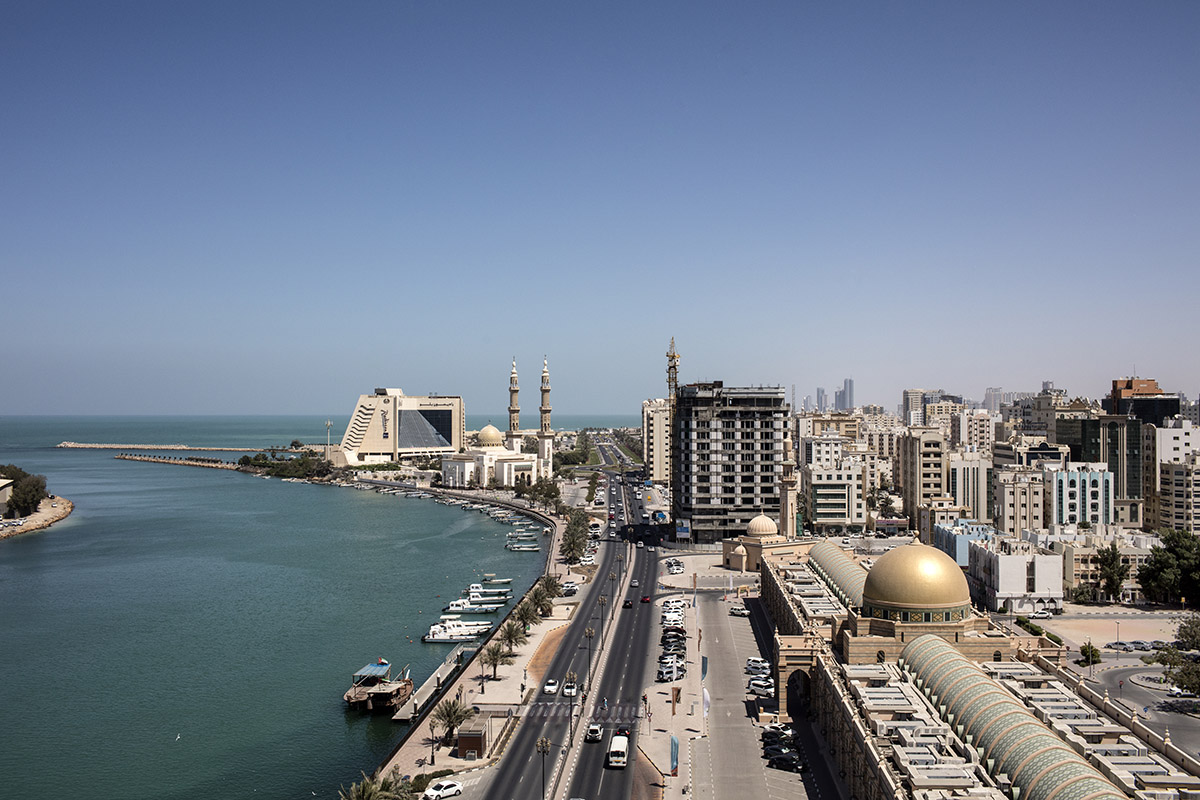
The Inaugural edition of Sharjah Architecture Triennial has kicked off in Sharjah, situated on the Persian Gulf coast of the United Arab Emirates. The first edition of the Triennial, curated by Adrian Lahoud, aims to reverse "dominant western perspectives" by tackling with common stereotypes in its own context and architecture in general.
The first edition of the Triennial has been opened to the public on November 9, 2019 and will be on view in two major venues until February 8, 2020 with the theme "Right of Future Generations".
The venues, which host the exhibitions, are the Al Jubail Vegetable Market built in the early 1980s and the Al-Qasimiyah School built in the mid 1970s - which is also the headquarters of the Triennial. The first installation shots have also been revealed by the Sharjah Architecture Triennial.

Curator Adrian Lahoud. Image © Rabee Younes
Sharjah Architecture Triennial is the first major platform for architecture and urbanism in the Middle East, North and East Africa, and South and Southeast Asia. Participating in international conversations while anchored in the specificity of Sharjah and the United Arab Emirates, we offer new spaces for critical reflection and foster research that situates the built environment within its complex social, economic, and cultural contexts.
The Triennial editions aim to highlight topical aspects of architecture and urbanism that have local relevance, and to engage Sharjah's existing built environment and social fabric. The focus of each theme, the involvement of diverse participants, and the range of events that take place during each edition provide opportunities for the production of new knowledge that we hope will resonate well beyond Sharjah.
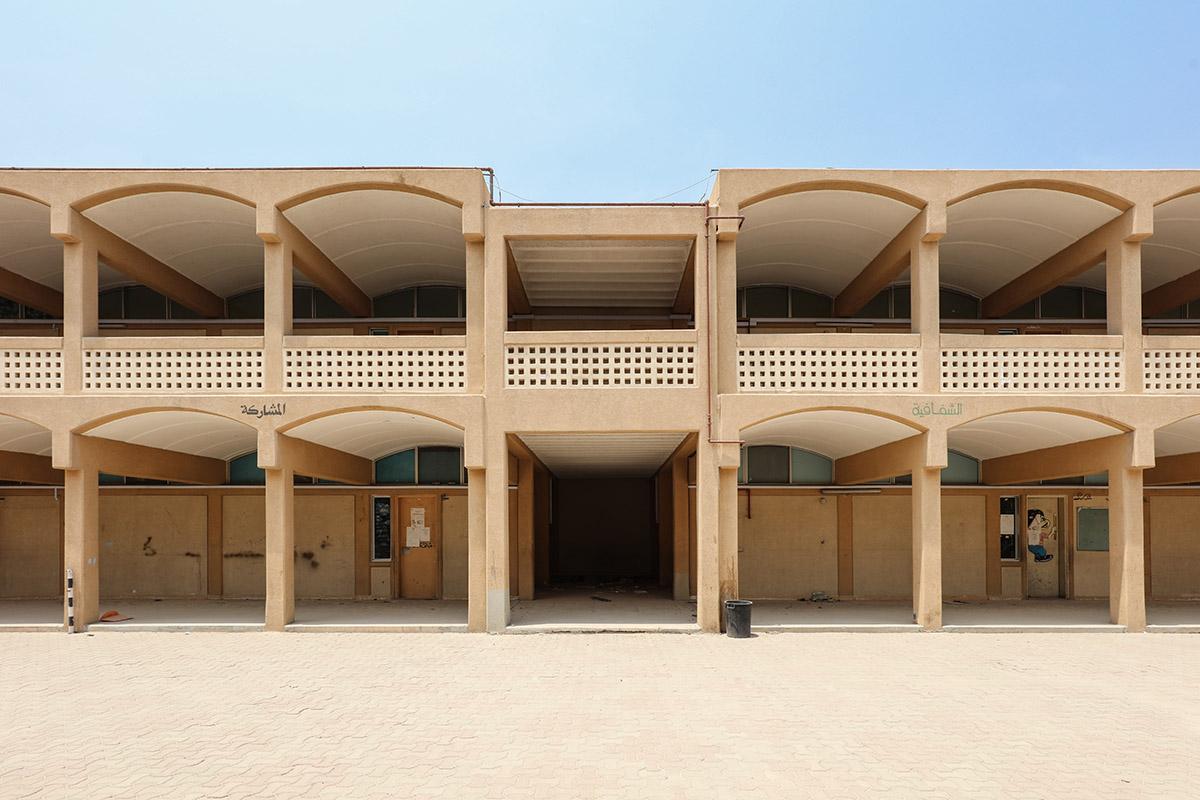
First venue is the Al-Qasimiyah School built in the mid 1970s. Image courtesy of Sharjah Architecture Triennial
"Rights of Future Generations is an invitation to radically rethink fundamental questions about architecture and itspower to create and sustain alternative modes of existence. The last decades have seen a massive expansion in rights, yet this expansion has failed to address long-standing challenges around environmental change and inequality," said Adrian Lahoud.
"A focus on rights to health, education, and housing as individual rights has obscured collective rights such as rights of nature and environmental rights. At the same time, the conceptualisation of rights as basic standards reduces the diversity of human existence to mere subsistence within a universal minimum."
"Rights of Future Generations questions how inheritance, legacy, and the state of the environment are passed from one generation to the next, how present decisions have long-term intergenerational consequences, and how other expressions of co-existence, including indigenous ones, might challenge dominant western perspectives," Lahoud added.
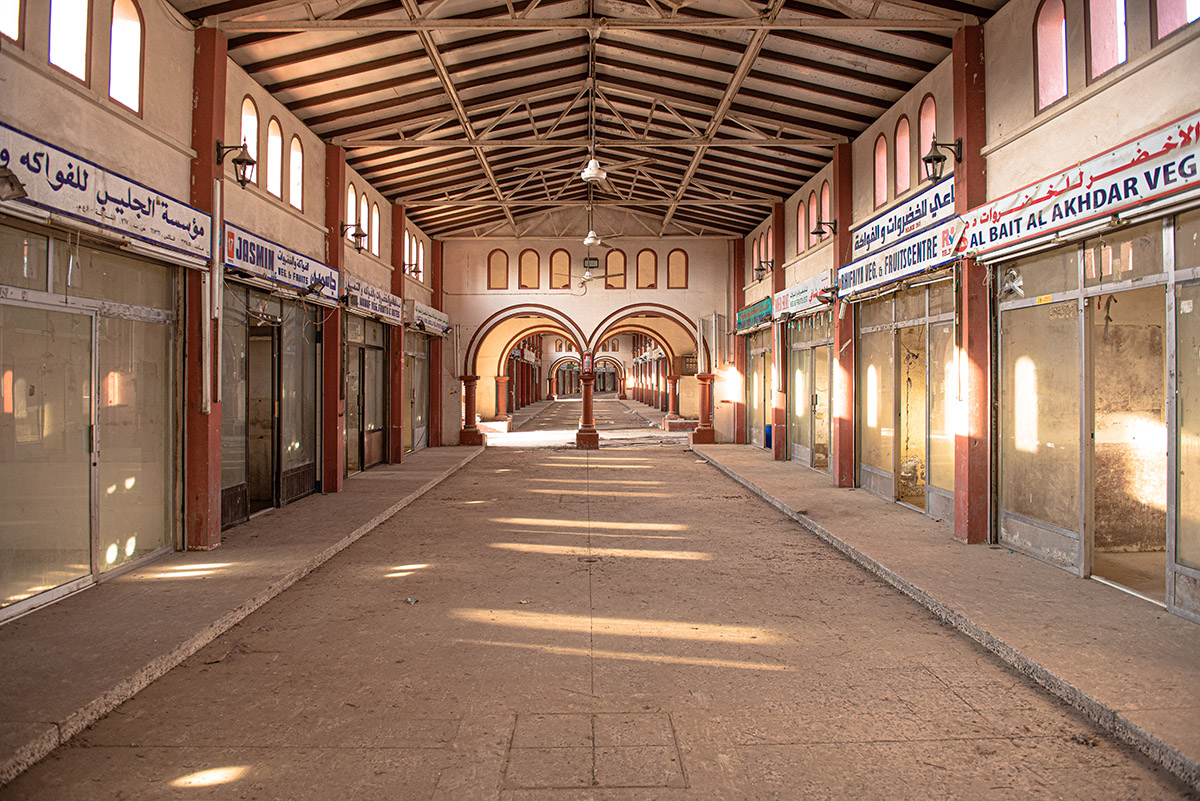
Al Jubail Vegetable Market built in the early 1980s. Image courtesy of Sharjah Architecture Triennial
Adrian Lahoud is Dean of the School of Architecture at the Royal College of Art London. His work critically examines concepts of scale and shelter in architecture in light of emancipatory urban and environmental struggles, focusing on the Middle East and Africa.
He was Research Fellow on the Forensic Architecture project and head of the MA Research Architecture at Goldsmiths University. He has also led urban design programs at the Architectural Association and University College London.
In addition to two major venues, Al Mureijah Art Spaces, the Mleiha Fort, Africa Hall in Al Manakh, and a RFGen commissioned platform in Um Al Tarafa will be additional spaces that will be home for the Triennial.
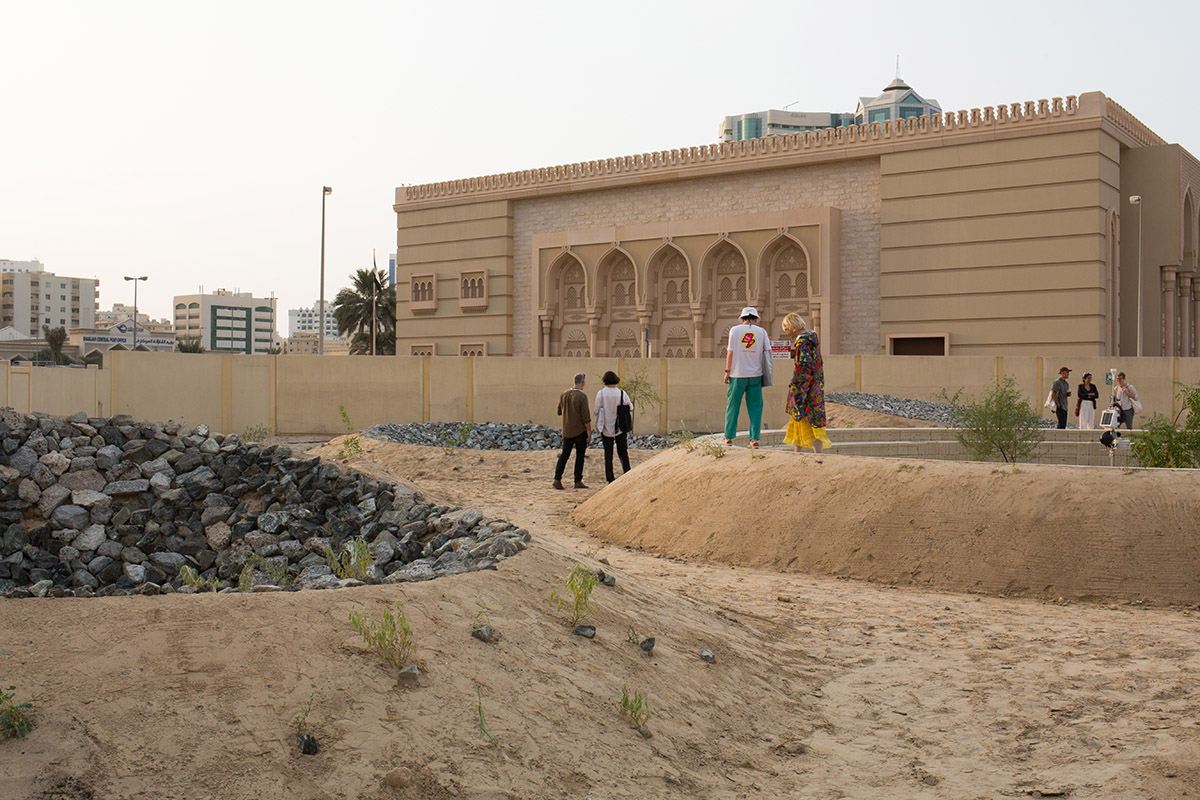
Cooking Sections, Becoming Xerophile, 2019. Installation view. Commissioned for ‘Rights of Future Generations’, inaugural edition of the Sharjah Architecture Triennial. 2019. Photo courtesy of Antoine Espinasseau.
Led by a guest curator selected by Sharjah Architecture Triennial, each edition runs for three months every three years. Local, regional, and international architects and researchers are invited to participate in an exciting calendar of exhibitions, conferences, and publications.
The Triennial editions aim to highlight topical aspects of architecture and urbanism that have local relevance, and to engage Sharjah's existing built environment and social fabric. The focus of each theme, the involvement of diverse participants, and the range of events that take place during each edition provide opportunities for the production of new knowledge that we hope will resonate well beyond Sharjah.
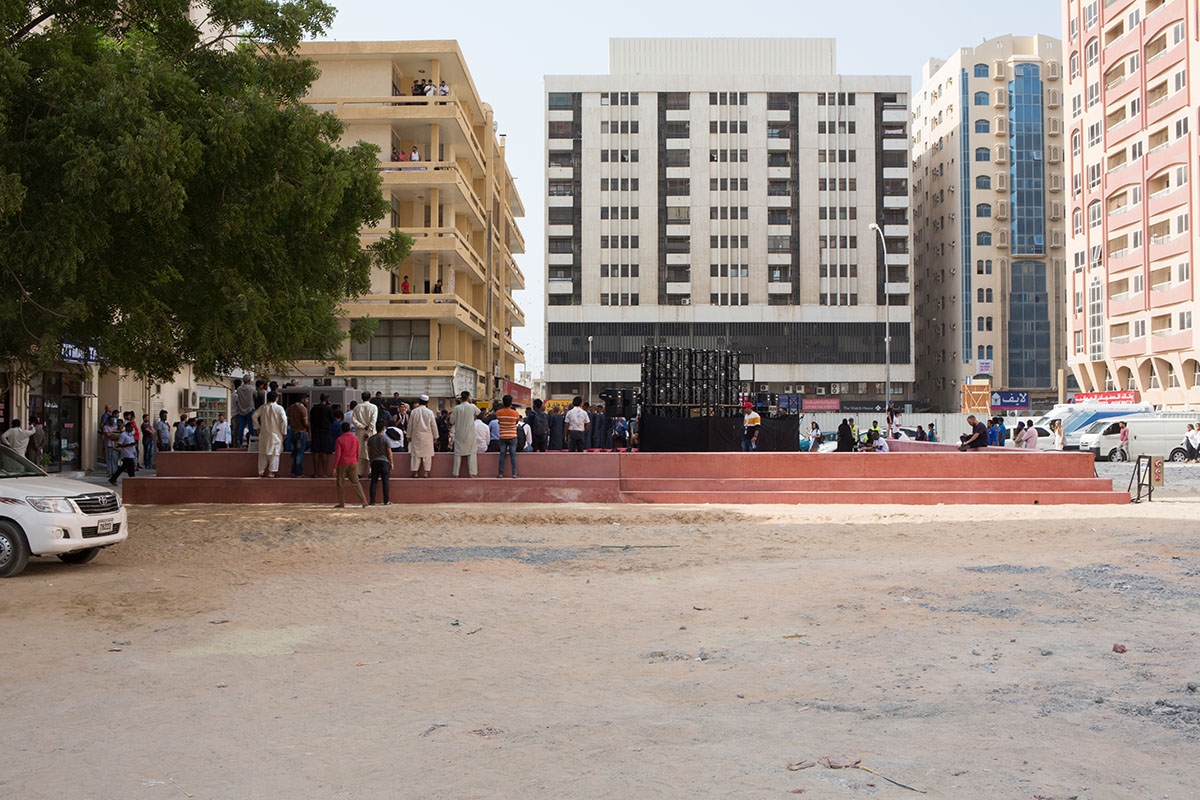
Dogma, Platforms, 2019. Installation view. Commissioned for ‘Rights of Future Generations’, inaugural edition of the Sharjah Architecture Triennial. 2019. Photo courtesy of Antoine Espinasseau.
The selected participants include:
- Fundación Desierto de Atacama (Alonso Barros, Gonzalo Pimentel, Juan Gili) + Mauricio Hidalgo
- Artist duo Cooking Sections (Alon Schwabe and Daniel Fernández Pascual) + AKIT II
- Dima Srouji, Dirar Kalash (sound artist), Silvia Truini (archaeologist and anthropologist), Nadia Abu El-Haj (anthropologist), and Shahrazad Odeh (lawyer).
- Architecture office DOGMA
- Felicity Scott + Mark Wasiuta
- Francesco Sebregondi + Jasbir K. Puar (queer theorist)
- HaRaKa Platform/Adham Hafez Company (Adham Hafez, Mohsen Binali, Mona Gamil, Lamia Gouda, Adam Kucharski, and Donia Massoud)
- Marina Tabassum Architects
- Visual artist Marwa Arsanios
- Anthropologist Nidhi Mahajan
- Public Works
- Samaneh Moafi + Platform 28 + WORKNOT! collective + Mhamad Safa + Maria Bessarabova and the residents of Mehr in Dowltabad, Esfahan
- Vivian Wang and Dewa Alit (composers) + U5 (artist collective) + Li Tavor, Alessandro Bosshard + Matthew van der Ploeg + Adam Jasper

Ngurrara Canvas II Awakening Ceremony, ‘Rights of Future Generations’, inaugural edition of the Sharjah Architecture Triennial. 2019. Photo courtesy of Sharjah Architecture Triennial
"Turning to alternative concepts of architecture and the environment, the Sharjah Architecture Triennial will focus on moments where experiments with architectural and institutional forms collaborate togenerate new social realities. Architecture’s power is fundamentally propositional and pedagogical," added Adrian Lahoud.
"Design is an opportunity to bring alternative modes of existence into being, including new concepts of what buildings, cities, landscapes, and territories are."
"In order to do that effectively, architecture has to find ways of working alongside institutions that are able to structure the protocols, habits and rituals that organize lives according to these new ideas," Lahoud continued.
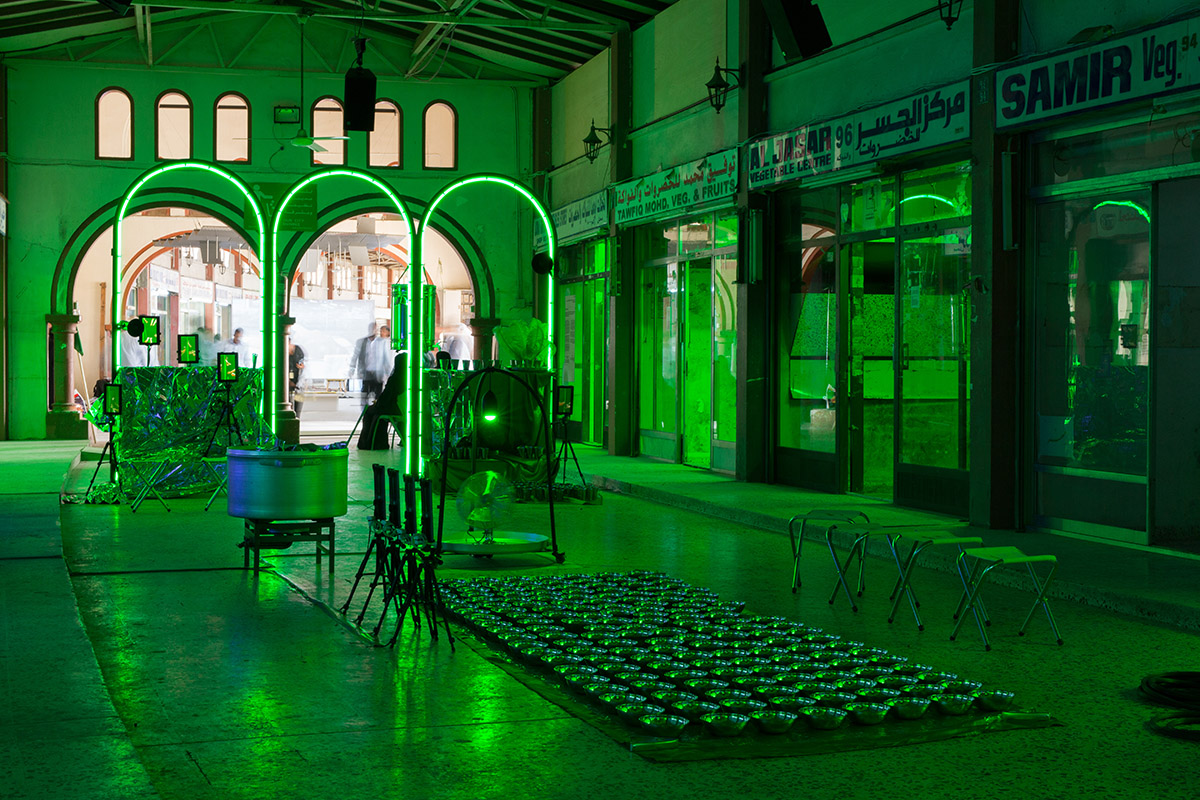
Samaneh Moafi with WORKNOT!, Mhamad Safa, Maria Bessarabova, Platform 28, and residents of Mehr in Dowlatabad, Esfahan, Parable of Mehr, 2019. Installation view. Commissioned by ‘Rights of Future Generations’, inaugural edition of the Sharjah Architecture Triennial. 2019. Photo by Antoine Espinasseau.
The Triennial also presents a section, titled Current Conditions, including a series of essay authored by the Triennial participants. This section explores sites of environmental struggle and social experimentation from across the Global South. The essays may be read both as an anticipation of the themes of the Triennial, and as a complement to the works on show.
"The Global South is not a region. It is an archipelago of islands that embody specific histories and conditions, where societies, space, and bodies have been organized differently from the dominant Western order," said the Triennial.
"These islands have suffered under empire, colonialism, and capitalist extraction – but they survived, and can suggest alternative ways of thinking about the environment."
Conditions is an editorial collaboration with Africa is a Country, Ajam Media Collective, ArtReview, e-flux architecture, Jadaliyya, and Mada Masr – who are publishing the essays online starting in August 2019. Conditions will also be a book, available at the Triennial in November 2019, and subsequently distributed through the international trade.
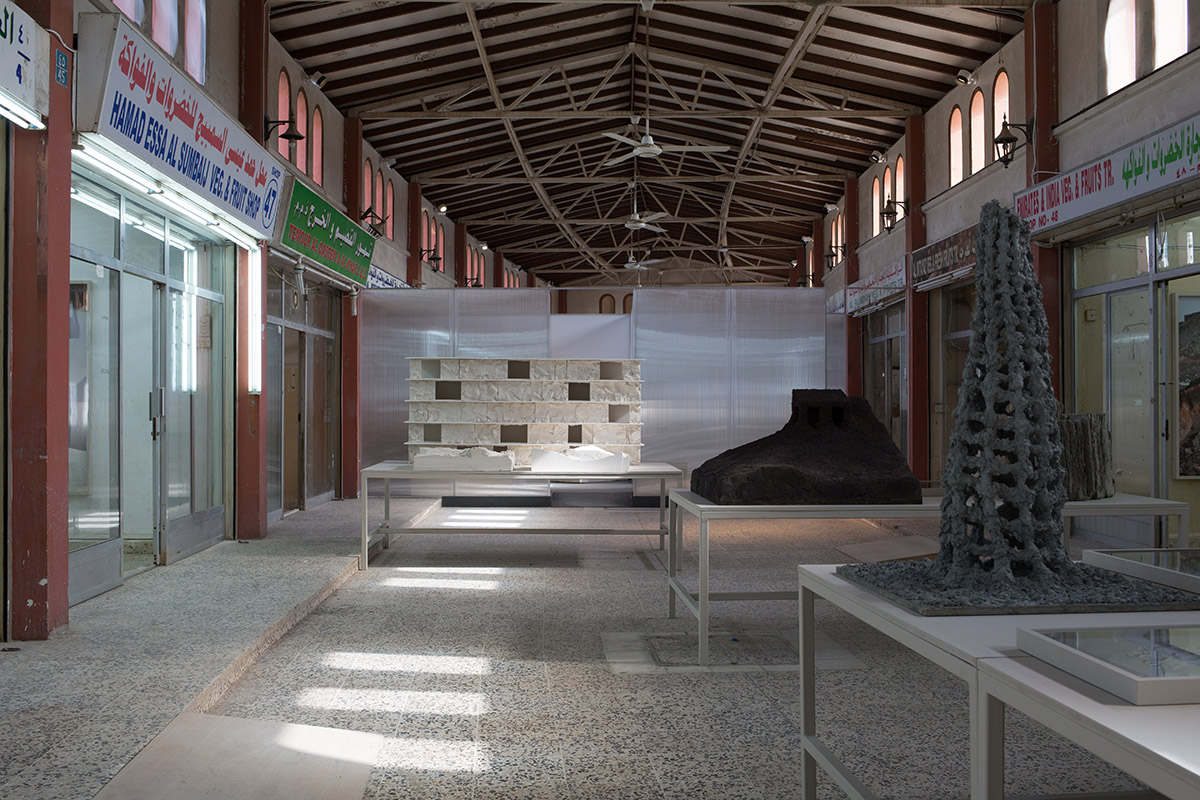
Studio Anne Holtrop, Material Gesture: Gypsum. Installation view. ‘Rights of Future Generations’, inaugural edition of the Sharjah Architecture Triennial. 2019. Photo courtesy of Antoine Espinasseau.
"The Triennial theme is motivated by the unique circumstances that architects, scholars, planners and artists in the Middle East, North Africa, East Africa, and South Asia face, from non-existent or fragmented archives, to restrictions on travel, or the absence of institutional support," added Lahoud.
"It aims to respond to this situation by initiating an archive of social spatial experimentation, laying the groundwork of a lasting resource for generations of architects, scholars, planners and artists to come."
"It wilt also use the occasion of the inaugural Sharjah Architecture Triennial to create a platform for dialogue between an emerging generation of architects drawn from across the global south, the Arabic-speaking world, and their diaspora."
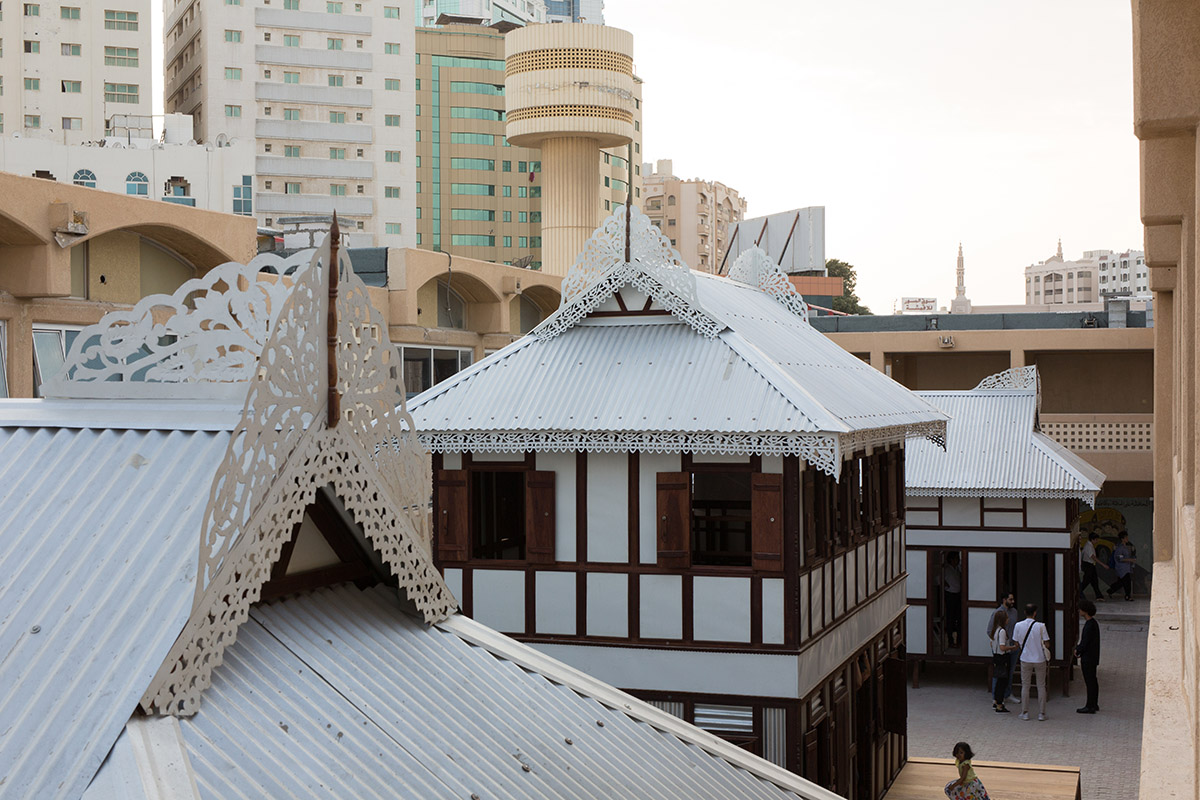
Marina Tabassum Architects, Inheriting Wetness, 2019. Installation view. Commissioned for ‘Rights of Future Generations’, inaugural edition of the Sharjah Architecture Triennial. 2019. Photo courtesy of Antoine Espinasseau.
Lahoud's recent exhibition projects include: 'Climate Crimes' inThe Future Starts Here, The Victoria and Albert Museum, London, 2018; 'The Shape of the Eclipse' in Let's Talk about the Weather: Art and Ecology in a Time of Crisis, Sursock Museum, Beirut, 2016; 'Secular Cosmologies' in the Oslo Architecture Triennale 2016: After Belonging. Recent publications include: 'The Mediterranean: A New Imaginary 'in New Geographies, Harvard University Press; 'The Bodele Declaration' in Grain, Vapor, Ray: Textures of the Anthropocene, MIT Press; and 'Nomos and Cosmos' in Supercommunity, MIT Press.
Sharjah Architecture Triennial was founded in 2017 by Sheikh Khalid Bin Sultan Al Qasimi, Chairman of the Triennial. Emiri Decree No. 23, issued on March 13, 2018, recognized the Triennial as an independent program, the aims of which include advancing and raising awareness about architecture and urbanism, and integrating architectural research with practice.
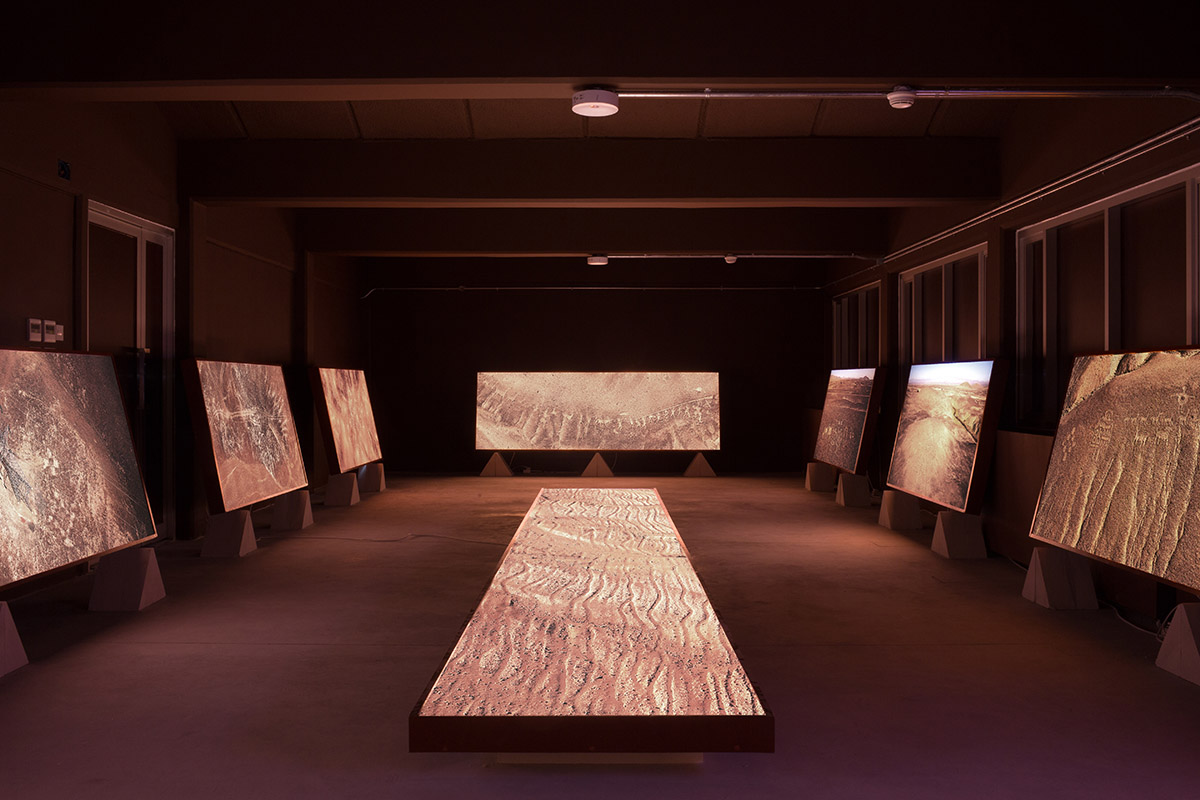
Alonso Barros, Gonzalo Pimentel, Juan Gili, and Mauricio Hidalgo, The Atacama Lines, 2019. Installation view. Commissioned by ‘Rights of Future Generations’, inaugural edition of the Sharjah Architecture Triennial. 2019. Photo by Antoine Espinasseau.
Sharjah is uniquely situated on both the Gulf and Indian Ocean coasts, the Emirate of Sharjah — one of the seven that constitute the United Arab Emirates — is at the crossroads of millennia of exchange and mobility, bringing offering an ideal place for conversations about architecture and urbanism.
Archaeological sites and the artifacts displayed at local museums reveal intimate links between inhabitants of the various settlements that flourished in Sharjah and contemporaneous civilizations, from the Mediterranean to the West, Mesopotamia to the north, and the Indus Valley to the east.

Nidhi Mahajan, Silences and Spectres of the Indian Ocean, 2019. Installation view. Commissioned for ‘Rights of Future Generations’, inaugural edition of the Sharjah Architecture Triennial. 2019. Photo courtesy of Antoine Espinasseau.
This rich legacy of cultural encounters is further highlighted by Sharjah's numerous cultural initiatives. Since its inception in 1993, the Sharjah Biennial has grown into one of the most influential global art institutions, Sharjah Art Foundation.
The annual Sharjah International Book Fair, launched in 1982, attracts scholars and publishers from around the world. Additionally, Sharjah has been named the Arab Capital of Culture as well as the Capital of Islamic Culture in recognition of its pioneering cultural patronage.

Adam Jasper with Li Tavor, Alessandro Bosshard, Matthew van der Ploeg, Max Kriegleder, Vivian Wang, Dewa Alit, Vibeke Sorensen, and U5, Priests and Programmers, 2019. Installation view. Commissioned for ‘Rights of Future Generations’, inaugural edition of the Sharjah Architecture Triennial. 2019. Photo courtesy of Antoine Espinasseau.
The Triennial complements these diverse initiatives, focusing the conversation on the critical role that architecture and urbanism can play in the present and future of a welcoming and livable Sharjah.
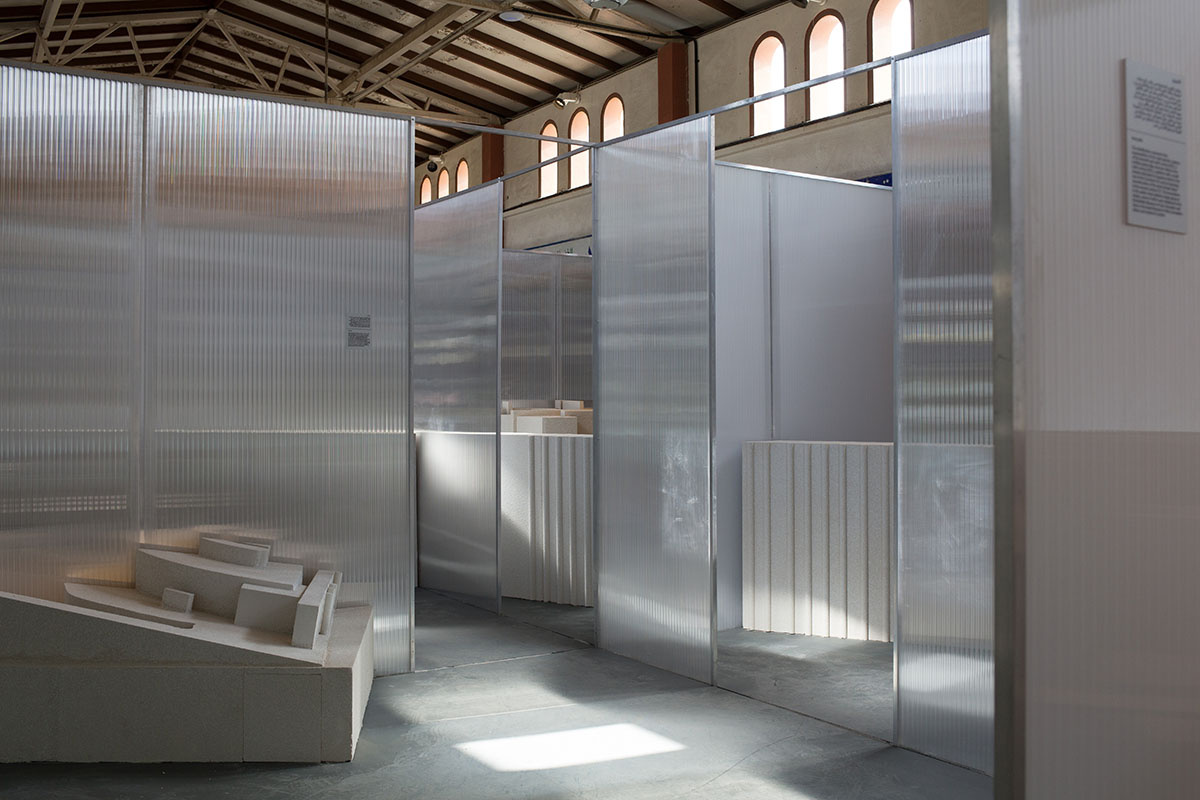
Dima Srouji with Dirar Kalash, Silvia Truini, Nadia Abu El-Haj, and Omar Jabareen, Depth Unknown, 2019. Installation view. Commissioned by ‘Rights of Future Generations’, inaugural edition of the Sharjah Architecture Triennial. 2019. Photo by Antoine Espinasseau
The Board of Directors supports the Triennial in meeting its mission. In addition to Sheikh Khalid Bin Sultan Al Qasimi, also Chairman of the Sharjah Urban Planning Council, the Board is currently constituted by Sheikha Hoor Al Qasimi, President and Director of Sharjah Art Foundation; Khalid Al Ali, Secretary General of the Sharjah Urban Planning Council; Khalid Bin Butti Al Muhairi, Chairman of the Sharjah Directorate of Town Planning and Survey; Khaled Al Huraimel, Group Chief Executive Officer of Bee'ah; and George Katodrytis, Professor and Head of Department of Architecture at the American University of Sharjah.
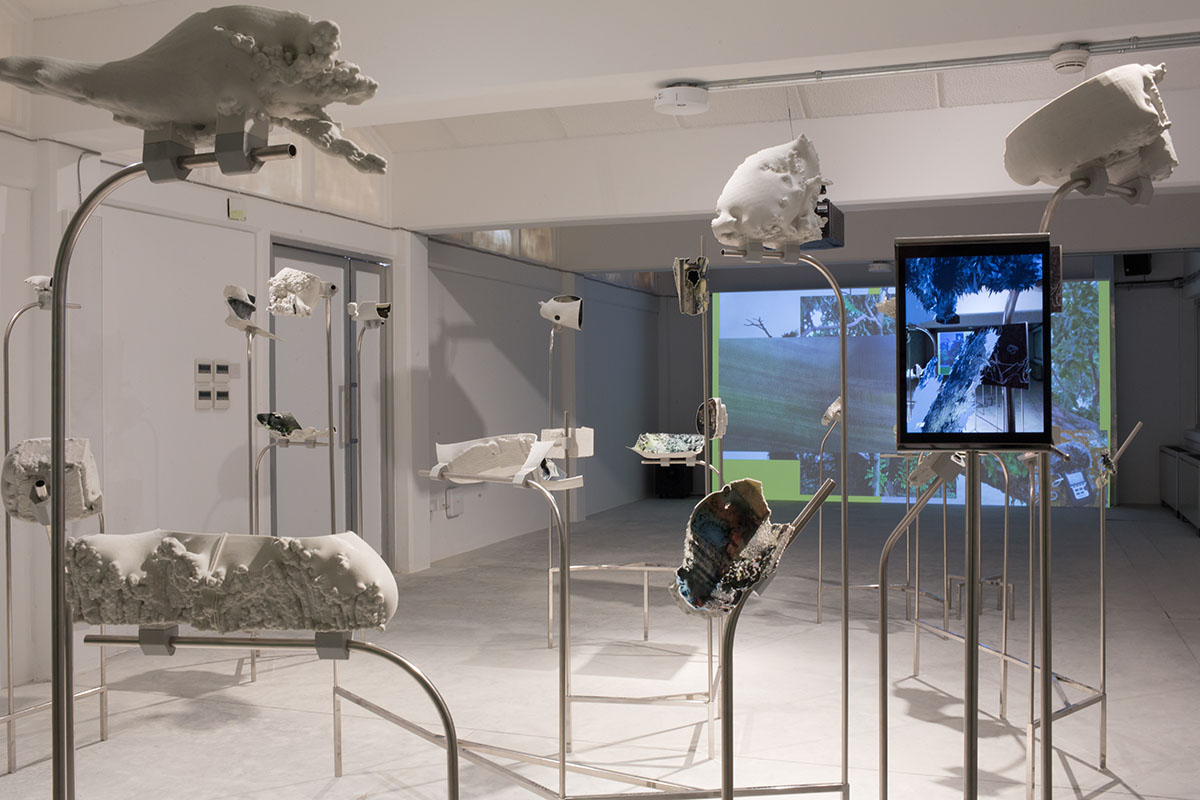
Ibiye Camp with Emmy Bacharach and David Killingsworth, The Sacred Forests of Ethiopia, 2019. Commissioned for ‘Rights of Future Generations’, inaugural edition of the Sharjah Architecture Triennial. 2019. Photo courtesy of Antoine Espinasseau
Sharjah Architecture Triennial facts:
Dates: November 9, 2019 - February 8, 2020
Curator: Adrian Lahoud
Venues: Al-Qasimiyah School in Al Manakh, the old Al Jubail Souq Fruit & Vegetable Market, Al Mureijah Art Spaces, the Mleiha Fort, Africa Hall in Al Manakh, and a RFGen commissioned platform in Um Al Tarafa.
Location: Sharjah, UAE
Top image: Aerial view of Corniche Street, Sharjah. Image © Ieva Saudargaitė
